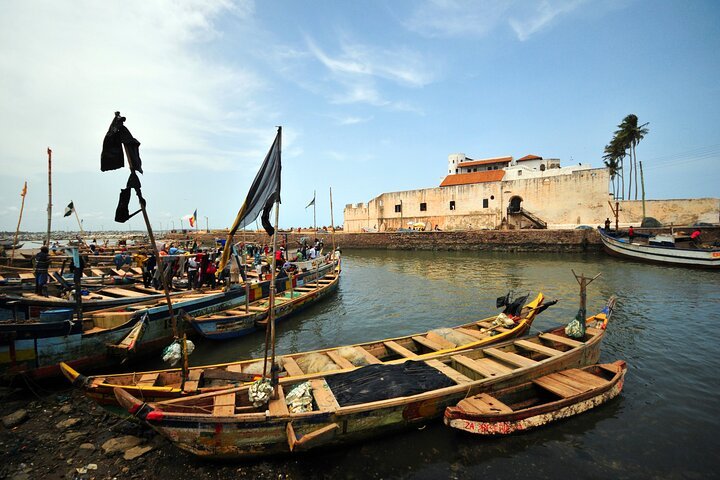Year of Return: Boosting Ghana’s Cultural Exchange with the African Diaspora

In 2019, the Ghanaian government declared the Year of Return, a year-long initiative to commemorate the 400th anniversary of the arrival of the first enslaved Africans in Virginia, USA. This idea encouraged African Americans and the diaspora to visit Ghana to connect with their ancestral roots. The Year of Return was a resounding success, attracting over 1.1 million visitors to Ghana and generating significant economic benefits through job creation and cultural promotion.
The success of the Year of Return spurred the Ghanaian President, Nana Akufo Addo, to declare the Beyond the Return initiative, which aims to build on the momentum of the Year of Return and further deepen the connection between Ghana and the African and Ghanaian diaspora. The initiative also seeks to highlight Ghana as a world-class, authentic global tourism brand, celebrate and showcase the commercial value of the creative sectors of the Ghanaian economy, and promote the growth of both domestic and international arrivals.
Ghana has long been a popular tourist destination due to its rich cultural history and African heritage. The Year of the Return was a deliberate effort by the Ghanaian government to celebrate this heritage and encourage the diaspora to reconnect with their roots. As a result, many African Americans, including celebrities, have taken advantage of the opportunity to return to Africa and explore Ghana’s diverse culture.
Tourists have visited over twenty tour sites, including the Cape Coast Castle and the Elmina Castle, which played a significant role in the transatlantic slave trade. The Kwame Nkrumah museum is another location with deep African history, providing visitors with many opportunities to learn about Ghana’s rich cultural heritage.
The Beyond the Return initiative has also led to the development of various entertaining events occurring nationwide, such as the Afrochella, Afro Nation, Back to Our Roots Tour, Detty Rave concerts and many others. These events have helped draw people from all walks of life to Ghana to celebrate the beauty of Africa. Additionally, the Pan-African Historical Theatre Festival (PANAFEST) has become a significant Beyond the Return initiative feature. The festival celebrates African culture and history through music, dance, drama, and poetry, with performances throughout the country, including historic forts and castles along the coast that played a significant role in the transatlantic slave trade. The festival is a powerful reminder of the importance of preserving and celebrating African heritage.
Positive impact of the Year of the Return

The “Year of Return” initiative was a resounding success in more ways than one. Apart from its historical significance, the initiative had far-reaching economic, cultural, and social benefits.
From an economic perspective, the initiative was a game-changer for Ghana. It generated over $1.9 billion in revenue, significantly boosting the country’s economy. The influx of visitors also created jobs in the tourism industry, providing employment opportunities for many Ghanaians. As a result, it reduced unemployment levels, and the country’s economy became more diversified. Additionally, the initiative promoted the growth of local businesses, such as restaurants, hotels, and souvenir shops. Establishing new industries, such as tour companies (like certified Africa and Ghana Cross culture) and transportation services, further helped diversify the economy.
Culturally, the “Year of Return” initiative was an excellent opportunity to showcase Ghanaian culture, history, and traditions to the world. It provided a platform for visitors to experience Ghanaian culture firsthand, from participating in cultural events to visiting historical sites and interacting with Ghanaians. As a result, visitors gained a deeper understanding of Ghanaian culture, which helped to promote cultural exchange and unity.
Regarding social impact, the “Year of Return” initiative strengthened the relationship between Ghana and the African diaspora. Visitors learned about Ghanaian culture, history, and traditions, while Ghanaians learned from African American visitors. The initiative also encouraged a sense of pride in Ghanaian culture and history as Ghanaians showcased their culture and history to the world. Additionally, the “Year of the Return” promoted unity among Ghanaians, as people from all over the country came together to welcome the tourists and participate in the different events.
Overall, the “Year of Return” initiative was a resounding success that brought Ghana significant economic, cultural, and social benefits. It highlighted the importance of cultural exchange, promoted unity, and strengthened the relationship between Ghana and the African diaspora.
Challenges from the Year of the return

Ghana launched The Year of the Return initiative to promote the country as a tourist destination. African American celebrities spearheaded this initiative and encouraged people to visit Ghana, sparking interest in the country’s rich history and culture. However, there have been concerns about this initiative’s impact on ordinary Ghanaians’ economic well-being.
Critics of the Year of the Return have pointed out that the focus on celebrities may have overshadowed the opportunity for visitors to experience Ghana at its core. Instead of immersing themselves in local culture and customs, some visitors merely saw a few sites before leaving. This approach to tourism has left some people questioning what Ghana truly has to offer.
Furthermore, some Ghanaians have expressed disappointment that the Year of the Return activities focused mainly on the capital and a few other cities, leaving the Northern part of the country largely unexplored. Additionally, the ease with which celebrities were granted access to the President at the Jubilee House has caused resentment among some citizens who feel they should have equal access to their leader.
Another concern is that the return of African Americans to Ghana may have unintended consequences, similar to what happened in Liberia, where formerly enslaved people established their elite settlements. Ghanaians fear that this could create a divide between returning African Americans and the local population.
Ghanaian citizens have also called for reinvesting income generated from tourism into communities with these tourist attractions. This reinvestment would improve the quality of life for natives and enhance the overall appeal of the country as a tourist destination.
Despite the positive effects of the Year of the Return, such as the return of African Americans who bought land and settled in Ghana, this influx of visitors has also had negative consequences. The cost of living in the country has risen, and the wealth gap has widened, with real estate prices now listed in dollars.
Overall, while the Year of the Return has undoubtedly raised the profile of Ghana as a tourist destination, there is a need for a more sustainable approach that benefits all Ghanaians and ensures the preservation of the country’s rich cultural heritage.
What other African countries can learn from the Year of Return
The Year of Return initiative in Ghana can serve as a model for other African countries looking to promote tourism and showcase their unique cultural heritage. Across Africa, many different cultural experiences and heritage sites are waiting for exploration. With suitable investment in infrastructure, African countries can attract visitors while ensuring their safety and comfort.
African countries can take inspiration from Ghana’s success in promoting its cultural and historical sites to visitors. By promoting their own unique cultural experiences and heritage sites, other African countries can create similar initiatives to attract visitors. These initiatives can also focus on promoting cultural exchange to encourage learning and exchanging ideas.
Improving transportation infrastructure, such as direct flights and train rides, can help connect different cities and reduce the cost and difficulty of travel. These improvements will make it easier for visitors to explore more of Africa’s offerings.
However, countries must ensure their tourism initiatives benefit all citizens, not just visitors. African countries should reinvest the profits from tourism back into the host communities to improve their quality of life. Additionally, they should ensure the fair treatment of citizens and protection from visitors taking over their lands.
In conclusion, the Year of Return initiative in Ghana has proven to be a major success, bringing various benefits to the country, including economic, cultural, and social growth. The idea can be a source of inspiration for other African countries to promote their unique cultures and improve their tourism industry. The success of the Year of Return has demonstrated the importance of cultural exchange, infrastructure development, and inclusivity for other African countries to create sustainable tourism initiatives that can bring significant advantages to visitors and local citizens.
By following the blueprint of the Year of Return, African countries can showcase their distinctive cultural heritage, attract more visitors, and create more job opportunities, thus contributing to the growth of their economies. Overall it has shown that, with suitable investment in infrastructure and cultural promotion, African countries can tap into the enormous potential of the tourism industry and create sustainable growth for the benefit of all.












